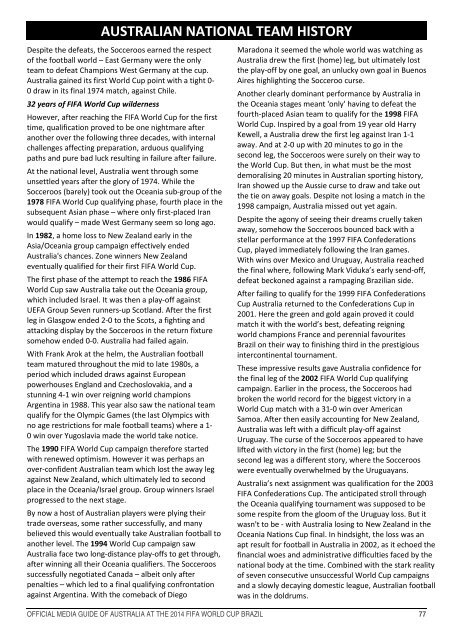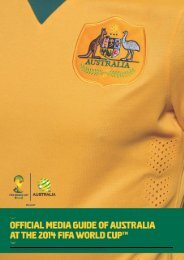OFFICIAL MEDIA GUIDE OF AUSTRALIA AT THE 2014 FIFA WORLD CUP BRAZIL 0
AFWC14MG
AFWC14MG
You also want an ePaper? Increase the reach of your titles
YUMPU automatically turns print PDFs into web optimized ePapers that Google loves.
<strong>AUSTRALIA</strong>N N<strong>AT</strong>IONAL TEAM HISTORY<br />
Despite the defeats, the Socceroos earned the respect<br />
of the football world – East Germany were the only<br />
team to defeat Champions West Germany at the cup.<br />
Australia gained its first World Cup point with a tight 0-<br />
0 draw in its final 1974 match, against Chile.<br />
32 years of <strong>FIFA</strong> World Cup wilderness<br />
However, after reaching the <strong>FIFA</strong> World Cup for the first<br />
time, qualification proved to be one nightmare after<br />
another over the following three decades, with internal<br />
challenges affecting preparation, arduous qualifying<br />
paths and pure bad luck resulting in failure after failure.<br />
At the national level, Australia went through some<br />
unsettled years after the glory of 1974. While the<br />
Socceroos (barely) took out the Oceania sub-group of the<br />
1978 <strong>FIFA</strong> World Cup qualifying phase, fourth place in the<br />
subsequent Asian phase – where only first-placed Iran<br />
would qualify – made West Germany seem so long ago.<br />
In 1982, a home loss to New Zealand early in the<br />
Asia/Oceania group campaign effectively ended<br />
Australia's chances. Zone winners New Zealand<br />
eventually qualified for their first <strong>FIFA</strong> World Cup.<br />
The first phase of the attempt to reach the 1986 <strong>FIFA</strong><br />
World Cup saw Australia take out the Oceania group,<br />
which included Israel. It was then a play-off against<br />
UEFA Group Seven runners-up Scotland. After the first<br />
leg in Glasgow ended 2-0 to the Scots, a fighting and<br />
attacking display by the Socceroos in the return fixture<br />
somehow ended 0-0. Australia had failed again.<br />
With Frank Arok at the helm, the Australian football<br />
team matured throughout the mid to late 1980s, a<br />
period which included draws against European<br />
powerhouses England and Czechoslovakia, and a<br />
stunning 4-1 win over reigning world champions<br />
Argentina in 1988. This year also saw the national team<br />
qualify for the Olympic Games (the last Olympics with<br />
no age restrictions for male football teams) where a 1-<br />
0 win over Yugoslavia made the world take notice.<br />
The 1990 <strong>FIFA</strong> World Cup campaign therefore started<br />
with renewed optimism. However it was perhaps an<br />
over-confident Australian team which lost the away leg<br />
against New Zealand, which ultimately led to second<br />
place in the Oceania/Israel group. Group winners Israel<br />
progressed to the next stage.<br />
By now a host of Australian players were plying their<br />
trade overseas, some rather successfully, and many<br />
believed this would eventually take Australian football to<br />
another level. The 1994 World Cup campaign saw<br />
Australia face two long-distance play-offs to get through,<br />
after winning all their Oceania qualifiers. The Socceroos<br />
successfully negotiated Canada – albeit only after<br />
penalties – which led to a final qualifying confrontation<br />
against Argentina. With the comeback of Diego<br />
Maradona it seemed the whole world was watching as<br />
Australia drew the first (home) leg, but ultimately lost<br />
the play-off by one goal, an unlucky own goal in Buenos<br />
Aires highlighting the Socceroo curse.<br />
Another clearly dominant performance by Australia in<br />
the Oceania stages meant 'only' having to defeat the<br />
fourth-placed Asian team to qualify for the 1998 <strong>FIFA</strong><br />
World Cup. Inspired by a goal from 19 year old Harry<br />
Kewell, a Australia drew the first leg against Iran 1-1<br />
away. And at 2-0 up with 20 minutes to go in the<br />
second leg, the Socceroos were surely on their way to<br />
the World Cup. But then, in what must be the most<br />
demoralising 20 minutes in Australian sporting history,<br />
Iran showed up the Aussie curse to draw and take out<br />
the tie on away goals. Despite not losing a match in the<br />
1998 campaign, Australia missed out yet again.<br />
Despite the agony of seeing their dreams cruelly taken<br />
away, somehow the Socceroos bounced back with a<br />
stellar performance at the 1997 <strong>FIFA</strong> Confederations<br />
Cup, played immediately following the Iran games.<br />
With wins over Mexico and Uruguay, Australia reached<br />
the final where, following Mark Viduka’s early send-off,<br />
defeat beckoned against a rampaging Brazilian side.<br />
After failing to qualify for the 1999 <strong>FIFA</strong> Confederations<br />
Cup Australia returned to the Confederations Cup in<br />
2001. Here the green and gold again proved it could<br />
match it with the world’s best, defeating reigning<br />
world champions France and perennial favourites<br />
Brazil on their way to finishing third in the prestigious<br />
intercontinental tournament.<br />
These impressive results gave Australia confidence for<br />
the final leg of the 2002 <strong>FIFA</strong> World Cup qualifying<br />
campaign. Earlier in the process, the Socceroos had<br />
broken the world record for the biggest victory in a<br />
World Cup match with a 31-0 win over American<br />
Samoa. After then easily accounting for New Zealand,<br />
Australia was left with a difficult play-off against<br />
Uruguay. The curse of the Socceroos appeared to have<br />
lifted with victory in the first (home) leg; but the<br />
second leg was a different story, where the Socceroos<br />
were eventually overwhelmed by the Uruguayans.<br />
Australia’s next assignment was qualification for the 2003<br />
<strong>FIFA</strong> Confederations Cup. The anticipated stroll through<br />
the Oceania qualifying tournament was supposed to be<br />
some respite from the gloom of the Uruguay loss. But it<br />
wasn't to be - with Australia losing to New Zealand in the<br />
Oceania Nations Cup final. In hindsight, the loss was an<br />
apt result for football in Australia in 2002, as it echoed the<br />
financial woes and administrative difficulties faced by the<br />
national body at the time. Combined with the stark reality<br />
of seven consecutive unsuccessful World Cup campaigns<br />
and a slowly decaying domestic league, Australian football<br />
was in the doldrums.<br />
<strong><strong>OF</strong>FICIAL</strong> <strong>MEDIA</strong> <strong>GUIDE</strong> <strong>OF</strong> <strong>AUSTRALIA</strong> <strong>AT</strong> <strong>THE</strong> <strong>2014</strong> <strong>FIFA</strong> <strong>WORLD</strong> <strong>CUP</strong> <strong>BRAZIL</strong> 77





